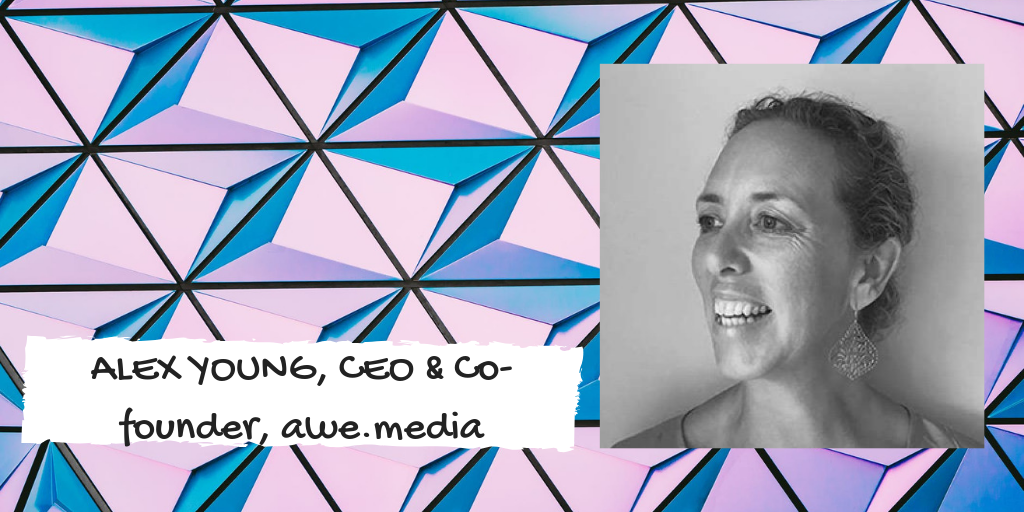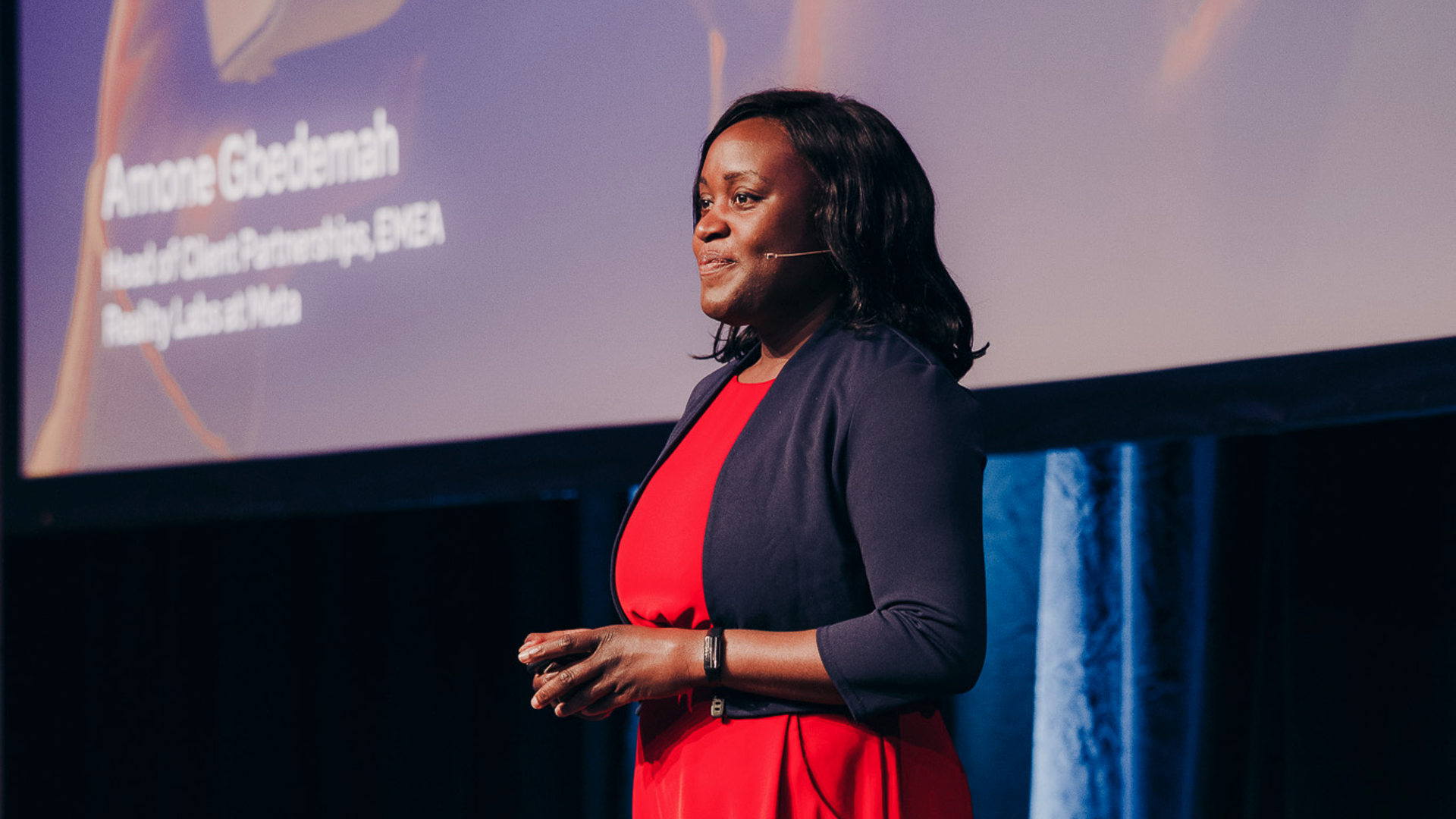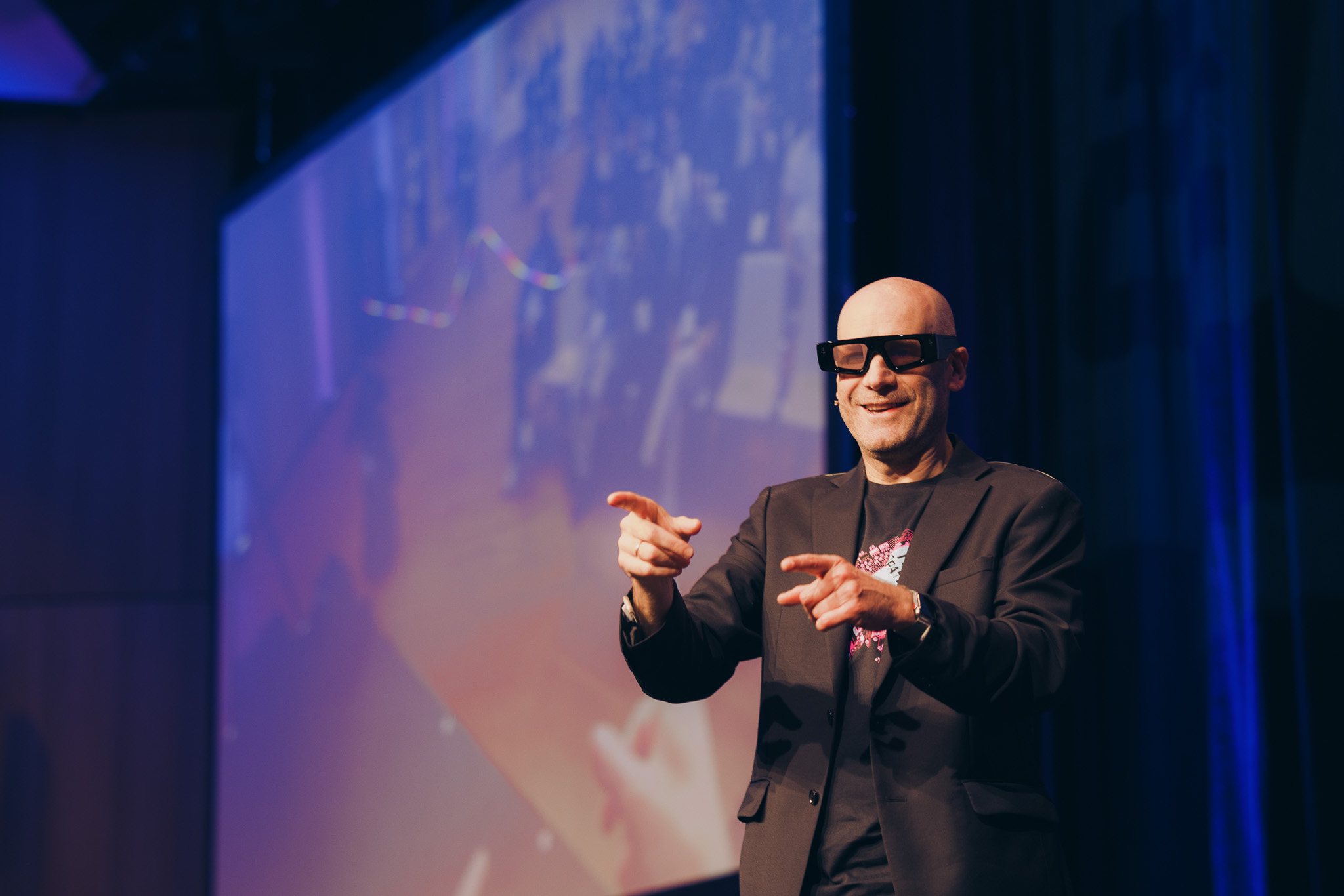When it comes to achieving gender equality, the technology industry is behind the U.S. economy as a whole. Women are paid less, receive less VC funding, and occupy fewer leadership and technical positions compared to men. So, for this Women's History Month, I am interviewing real women working in immersive tech, women who challenge the idea that the tech industry lacks visible female role models. Enjoy!
Emily: To begin, could you provide us with a little background on yourself and your career?
Alex: I've just moved into the role of CEO at awe, which stands for Augmented Web Experiences, The awe platform enables anyone to create AR and VR experiences on the web, accessed by a URL on any device. It supports image-based AR and Natural Feature Tracking, location-based AR, and VR and 360-degree interactive web apps.
At this point, I've been involved in emerging technologies for over 20 years across various sectors, including interactive TV, web-based learning platforms, telecommunications, video streaming, mobile payments (well before the days of Square and PayPal) and helping companies develop multi-device transactional platforms that place the user's needs first. I have always advocated that technology is an enabler of experiences and at the end of the day should be largely invisible. My driving passion has always been for the web as a delivery and consumption channel, and that has really shaped my career to date. I've been in the AR/VR space for the last twelve years and we developed the world's first web-based content management platform for creating mobile AR content back in 2009. This was buildAR.com.
Emily: What is it like as a woman working in AR/VR?
Alex: Having worked in technology for two decades, I had become used to being the only woman, or one of only a few women, in a team or company. With my own companies, we've always had a strong mix of women and are now at over 50% female, including the deep tech roles. One of the biggest changes I'm seeing as AR and VR become more mainstream is the influx of women into the space. I believe the inherently visual and storytelling-focused nature of the medium resonates with a lot of creative women who see the opportunity to tell their stories in new and engaging ways. This extends to the way in which they share their creative talents. I'm not suggesting men don't have the same capabilities; more that women who perhaps didn't believe they could contribute to tech are now seeing an opportunity to thrive in this area.
Emily: What challenges do you face that your male colleagues don't? Have you ever felt judged or overlooked because of your gender?
Alex: Whilst I've never been treated any differently by my male peers or singled out for being a female, there have been plenty of situations where I've had to interact with misogynistic males. This isn't common, and I've always seen it as an opportunity to work with them and challenge some of their innate views, rather than as a negative. By and large, these interactions have had positive outcomes; and I do feel this is changing, too. Most men I meet now are incredibly supportive of both our company vision and that we have a female guiding it.
Emily: What about the user experience for women; how do the devices fit and perform for women?
Alex: While some folks may not technically consider smartphones immersive devices, one of my biggest bugbears is that most mobile devices are made for large pockets and, as many women will understand, many items of female clothing have tiny pockets, if any at all. Take jeans, for example: I put a phone in my back pocket and it invariably falls out. When a male colleague puts his phone in his back pocket, it disappears! That aside, hardware form factors in the VR and haptics space especially are still in relative infancy. There are challenges with form and fit no matter what gender. Personally, I find the straps on many VR headsets don't fit me well and no matter what are always a little too loose. And controllers are often made for larger hands.
We conduct ethnographic research with students in elementary and high schools around how they use immersive technologies both for consumption and creation across different devices. In this context, it becomes evident that there is a lot more ideation to be carried out across different peripherals.
Emily: What is the most critical issue for women in AR/VR?
Alex: Many women in the industry have expressed concern in the past 12-18 months over the publicly reported conduct of some executives and founders in AR and VR companies acting inappropriately toward women. There has been widespread condemnation of these behaviors, which I applaud; however, it highlights that some people in the industry don't consider women as equal peers. I would like to stress that my experience of this behavior is limited to only a few and the vast majority of men and women I meet are supportive and encouraging. Look to enhance your own skills and contribute to great projects that advance the awareness and adoption of these technoloiges, and how they can be used for learning and storytelling to help others.
Emily: Do you believe there's a lack of content for women AR/VR users?
Alex: There is a lack of content in general, not just for women. There has historically been an adult male skew, especially in the VR gaming realm; however, that's changing as consumer awareness and adoption increases. And we're now seeing budgets being assigned to projects that are outside the media and entertainment industries. I'm personally excited to see this as it allows for exploration and creation of immersive content for experiences and contexts that are unexpected. Many of our customers are in the education space and to watch them adapting and extending their skills in learning design to a spatialized, immersive context and exploring these concepts with students is reinforcing my respect for teachers and the incredible experiences that will define the next generation of learning. While content has been expensive to create, I would like to think we are moving into an era of democratization where anyone can be a creator and the cost of creation is rapidly decreasing. With depth cameras/sensing becoming mainstream in the devices, AR/VR authoring platforms that don't require you to code, and the web as a major distribution and consumption channel; a lack of content will soon become a thing of the past.
Emily: What is your advice to women working in AR/VR today?
Alex: I have had many mentors in my career, both women and men, and not all of them have been involved in tech. My advice is to seek out people who are willing to share their knowledge and ask questions. Be respectful of their time and show them you're learning from them through action. Even if you don't agree with all the advice, you can still learn from it. And back youself! Do the hard yards, pick youself back up when things don't go as planned, and move forward. Tenacity is a required attribute working in emerging tech. And lastly, I don't believe it matters if you're male or female. Humans and human relationships are complex. Sometimes you'll meet or have to work with people you don't gel with. I've always found that even these relationships I can learn from, whether it be new technical or design skills or softer, people skills.
Emily: What would you like to say to the men in the space? What should they be doing to help women in tech?
Alex: To all the awesome guys, keep doing what you're doing. I've always felt completely supported by the men I've been fortunate enough to share my career with.
Emily: What is your greatest hope for the future of AR/VR?
Alex: For technologies that have been around for decades, now it feels like we're on the cusp of huge leaps within the space, both technologically and from a human-centered perspective. My advice is to learn about and understand where we've come from. There has been incredible work done by incredible people for a very long time. Soak this in and use that history to move the space forward.
Alex Young, CEO & Co-founder, awe.media
Emily: To begin, could you provide us with a little background on yourself and your career?
Alex: I've just moved into the role of CEO at awe, which stands for Augmented Web Experiences, The awe platform enables anyone to create AR and VR experiences on the web, accessed by a URL on any device. It supports image-based AR and Natural Feature Tracking, location-based AR, and VR and 360-degree interactive web apps.
At this point, I've been involved in emerging technologies for over 20 years across various sectors, including interactive TV, web-based learning platforms, telecommunications, video streaming, mobile payments (well before the days of Square and PayPal) and helping companies develop multi-device transactional platforms that place the user's needs first. I have always advocated that technology is an enabler of experiences and at the end of the day should be largely invisible. My driving passion has always been for the web as a delivery and consumption channel, and that has really shaped my career to date. I've been in the AR/VR space for the last twelve years and we developed the world's first web-based content management platform for creating mobile AR content back in 2009. This was buildAR.com.
Emily: What is it like as a woman working in AR/VR?
Alex: Having worked in technology for two decades, I had become used to being the only woman, or one of only a few women, in a team or company. With my own companies, we've always had a strong mix of women and are now at over 50% female, including the deep tech roles. One of the biggest changes I'm seeing as AR and VR become more mainstream is the influx of women into the space. I believe the inherently visual and storytelling-focused nature of the medium resonates with a lot of creative women who see the opportunity to tell their stories in new and engaging ways. This extends to the way in which they share their creative talents. I'm not suggesting men don't have the same capabilities; more that women who perhaps didn't believe they could contribute to tech are now seeing an opportunity to thrive in this area.
Emily: What challenges do you face that your male colleagues don't? Have you ever felt judged or overlooked because of your gender?
Alex: Whilst I've never been treated any differently by my male peers or singled out for being a female, there have been plenty of situations where I've had to interact with misogynistic males. This isn't common, and I've always seen it as an opportunity to work with them and challenge some of their innate views, rather than as a negative. By and large, these interactions have had positive outcomes; and I do feel this is changing, too. Most men I meet now are incredibly supportive of both our company vision and that we have a female guiding it.
Emily: What about the user experience for women; how do the devices fit and perform for women?
Alex: While some folks may not technically consider smartphones immersive devices, one of my biggest bugbears is that most mobile devices are made for large pockets and, as many women will understand, many items of female clothing have tiny pockets, if any at all. Take jeans, for example: I put a phone in my back pocket and it invariably falls out. When a male colleague puts his phone in his back pocket, it disappears! That aside, hardware form factors in the VR and haptics space especially are still in relative infancy. There are challenges with form and fit no matter what gender. Personally, I find the straps on many VR headsets don't fit me well and no matter what are always a little too loose. And controllers are often made for larger hands.
We conduct ethnographic research with students in elementary and high schools around how they use immersive technologies both for consumption and creation across different devices. In this context, it becomes evident that there is a lot more ideation to be carried out across different peripherals.
Emily: What is the most critical issue for women in AR/VR?
Alex: Many women in the industry have expressed concern in the past 12-18 months over the publicly reported conduct of some executives and founders in AR and VR companies acting inappropriately toward women. There has been widespread condemnation of these behaviors, which I applaud; however, it highlights that some people in the industry don't consider women as equal peers. I would like to stress that my experience of this behavior is limited to only a few and the vast majority of men and women I meet are supportive and encouraging. Look to enhance your own skills and contribute to great projects that advance the awareness and adoption of these technoloiges, and how they can be used for learning and storytelling to help others.
Emily: Do you believe there's a lack of content for women AR/VR users?
Alex: There is a lack of content in general, not just for women. There has historically been an adult male skew, especially in the VR gaming realm; however, that's changing as consumer awareness and adoption increases. And we're now seeing budgets being assigned to projects that are outside the media and entertainment industries. I'm personally excited to see this as it allows for exploration and creation of immersive content for experiences and contexts that are unexpected. Many of our customers are in the education space and to watch them adapting and extending their skills in learning design to a spatialized, immersive context and exploring these concepts with students is reinforcing my respect for teachers and the incredible experiences that will define the next generation of learning. While content has been expensive to create, I would like to think we are moving into an era of democratization where anyone can be a creator and the cost of creation is rapidly decreasing. With depth cameras/sensing becoming mainstream in the devices, AR/VR authoring platforms that don't require you to code, and the web as a major distribution and consumption channel; a lack of content will soon become a thing of the past.
Emily: What is your advice to women working in AR/VR today?
Alex: I have had many mentors in my career, both women and men, and not all of them have been involved in tech. My advice is to seek out people who are willing to share their knowledge and ask questions. Be respectful of their time and show them you're learning from them through action. Even if you don't agree with all the advice, you can still learn from it. And back youself! Do the hard yards, pick youself back up when things don't go as planned, and move forward. Tenacity is a required attribute working in emerging tech. And lastly, I don't believe it matters if you're male or female. Humans and human relationships are complex. Sometimes you'll meet or have to work with people you don't gel with. I've always found that even these relationships I can learn from, whether it be new technical or design skills or softer, people skills.
Emily: What would you like to say to the men in the space? What should they be doing to help women in tech?
Alex: To all the awesome guys, keep doing what you're doing. I've always felt completely supported by the men I've been fortunate enough to share my career with.
Emily: What is your greatest hope for the future of AR/VR?
Alex: For technologies that have been around for decades, now it feels like we're on the cusp of huge leaps within the space, both technologically and from a human-centered perspective. My advice is to learn about and understand where we've come from. There has been incredible work done by incredible people for a very long time. Soak this in and use that history to move the space forward.



